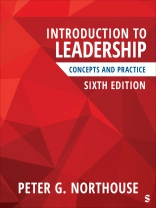New chapter on Working with Groups!
The Sixth Edition of Peter G. Northouse′s best-selling Introduction to Leadership: Concepts and Practice provides readers with a clear, concise overview of the complexities of practicing leadership and concrete strategies for becoming better leaders. The text is organized around key leader responsibilities such as creating a vision, engaging strengths, and managing conflict. Case studies, self-assessment questionnaires, observational exercises, and reflection and action worksheets allow readers to apply leadership concepts to their own lives.
Grounded in leadership theory and the latest research, the fully updated, highly practical new edition includes a new chapter on working with groups, 2 new cases, and 6 new Leadership Snapshots.
Jadual kandungan
Preface
Acknowledgments
About the Author
Chapter 1: Understanding Leadership
Chapter 2: Recognizing Your Traits
Chapter 3: Understanding Leadership Styles
Chapter 4: Attending to Tasks and Relationships
Chapter 5: Developing Leadership Skills
Chapter 6: Engaging Strengths
Chapter 7: Creating a Vision
Chapter 8: Working With Groups
Chapter 9: Embracing Diversity and Inclusion
Chapter 10: Managing Conflict
Chapter 11: Addressing Ethics in Leadership
Chapter 12: Exploring Destructive Leadership
Glossary of Key Terms
References
Index
Mengenai Pengarang
Peter G. Northouse, Ph D, is Professor Emeritus of Communication in the School of Communication at Western Michigan University. Leadership: Theory and Practice is the best-selling academic textbook on leadership in the world and has been translated into 15 languages. In addition to authoring publications in professional journals, he is the author of Introduction to Leadership: Concepts and Practice (now in its sixth edition) and co-author of Leadership Case Studies in Education (now in its fourth edition) and Health Communication: Strategies for Health Professionals (now in its third edition). His scholarly and curricular interests include models of leadership, leadership assessment, ethical leadership, and leadership and group dynamics. For more than 40 years, he has taught courses in leadership, interpersonal communication, and organizational communication on both the undergraduate and graduate levels. Currently, he is a consultant and lecturer on trends in leadership research, leadership development, and leadership education. He holds a doctorate in speech communication from the University of Denver, and master’s and bachelor’s degrees in communication education from Michigan State University.












